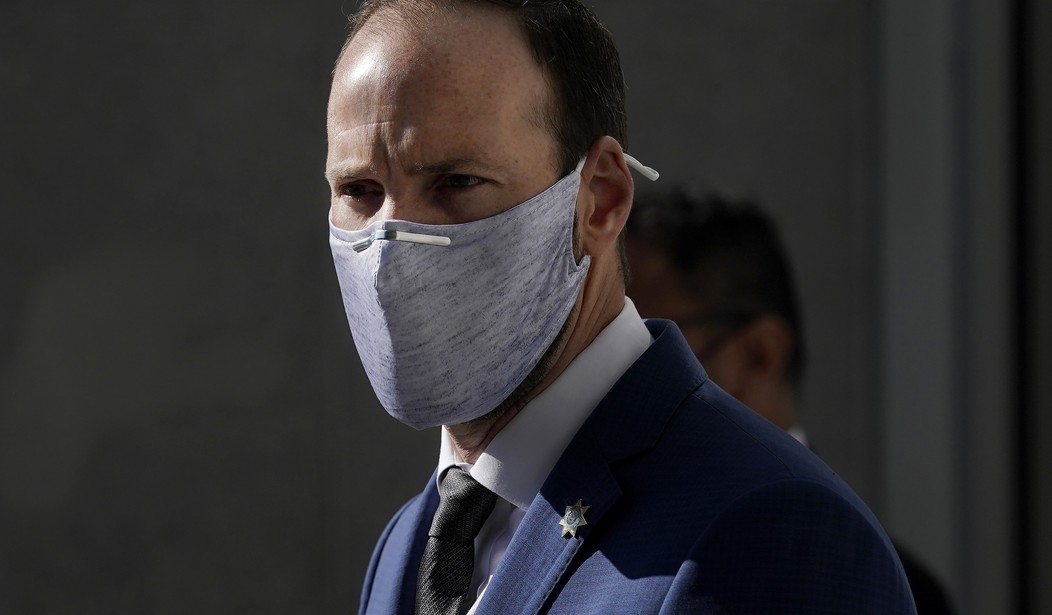Last Tuesday, San Francisco’s radical left-wing district attorney, Chesa Boudin, was buried in a recall landslide that shook the entire progressive movement from coast to coast. It was an earthquake that was accompanied by several other omens that presage a total rejection by the American electorate of radical-left ideology and, more importantly, a rejection of the notion that the American experiment doesn’t just need fine-tuning, it needs a total tear-down to rid the nation of its racist past.
That sort of rebellion died, at least in the near term. And at the same time Boudin was getting handed his hat in San Francisco, in Los Angeles, radical Democratic Rep. Karen Bass — expected to cruise to a primary victory in the mayoral race — was unexpectedly thrown into a runoff with billionaire Rick Caruso, who ran as a tough-on-crime, non-nonsense pragmatist.
The writing is on the wall for the radical left. Even in San Francisco, voters will only vote as radical as circumstances allow them to. And circumstances in San Francisco are becoming intolerable.
“The far left was talking a big game at the start of this cycle, but reality has intruded,” said Matt Bennett, co-founder of Third Way, a top centrist think tank.
“Democratic voters keep saying, over and over, that they do not want what the far left is selling. Deep-blue San Francisco has sent that message twice this year in recall elections. Voters in Minneapolis said the same, as did Democrats in New York City.”
Note that there are no statewide radicals in office at present. That may change as Pennsylvania’s radical left-wing Democratic Senate candidate, Lt. Gov. John Fetterman, eked out a victory over moderate Rep. Conor Lamb. Fetterman will go against Trump-backed Mehmet Oz in a race that most observers believe will be very close.
But the radicals have a numbers problem. And a race problem. Pew Research surveys show radicals to be just six percent of the public, and eight percent of 2020 voters. The surveys also show the far-left progressives to be overwhelmingly white and clustered in big cities.
In fact, the only political units where radicals have met success have been in cities. And now, even there the rejection of radical politics and politicians seems total. Naturally, it’s never the radicals’ fault. It’s always someone else’s.
The left’s response to Boudin’s recall is instructive. The voters who decided to recall their left-wing prosecutor were simply confused. “Why is recalling a prosecutor supposed to be an answer to homelessness? How is the mythic fusion of CRIMEANDHOMELESSNESS supposed to translate into any sort of ‘stark warning’ on these two separate policy questions?” demanded Tom Scocca. “Perhaps more than anything, Boudin’s recall shows how inchoate anger over the visible symptoms of inequality — homelessness, public drug use, property crime — can crystallize into a renunciation of an individual politician, even as voters broadly desire the policies that politician champions,” concludes Piper French.
The biggest takeaway from Boudin’s decisive defeat, according to the left, is that voters really like Boudin’s policies. [Emphasis added]
That just isn’t so and the numbers bear that out.
For the activists and few progressive officeholders who embraced Boudin’s platform, an overwhelming number of voters didn’t. They rejected a belief that a softer approach on crime was needed in their city and proved that positions messaged toward safety were paramount.
Boudin, who came into office just three years ago with much adoration from liberals, was recalled by 61 percent, according to The Associated Press.
As long as the left-wing remains stupid and clueless, they’ll have a devil of a time winning a substantial number of votes in any race.
But for how long? Many Democratic voters keep saying they don’t want radical solutions. But suppose someone like Beto O’Rourke comes along and disguises his radical proposals in soothing language? Barack Obama was able to charm many moderate Democrats with his stirring rhetoric, leading to Obamacare and radical proposals across the board.
A populist radical could very easily couch transformational proposals as necessary to bail out the economy. No doubt, as the radicals’ power grows in the Democratic Party, that scenario may become more likely.










